| Gemstone Chart |
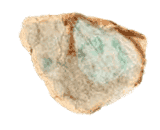 Natural Jadeite Natural Jadeite
A rare, usually green mineral of the pyroxene group. Jadeite can also occur in white, auburn, buff, or violet varieties. The most highly valued form of jade consists of jadeite.Jade has a history in China of at least four thousands years.Experts believe that, although more expensive, diamonds and gold cannot be compared with jade - jade is animated with a soul.
Color: Pure white thru pink, brown, red, orange, yellow, mauve, violet, blue, and black, to an extensive range of green and mottled green and white.
Categories: semi-precious stone
Chemical Composition: NaAl(SiO3)2
Crystal Group: Monoclinic
Refractive Index: 1.654 - 1.667
Hardness: 7
Density: 3.32
Occurrence: Northern Myanmar. Non commercial discoveries of Jadeite have also been reported in China; Russia (in the Polar Urals); Niigata, Japan; San Benito County, California, USA, and Guatemala.
| 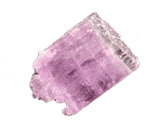 Natural Kunzite Natural Kunzite
Kunzite is the pink to light purple gem variety of the mineral Spodumene.Although kunzite is a relatively soft and delicate gem, and can fade after prolonged exposure to light, its appealing color makes it a popular gem. Small gems are seldom cut from kunzite because of its cleavage and strong pleochroism. It is rarely seen in rings, necklaces, or any other forms of jewelry where small stones are required.
Color: Pink, Lilac, Light Violet
Categories: semi-precious stone
Chemical Composition: LiAlSi2O6
Crystal Group: Monoclinic
Refractive Index: 1.660 - 1.675
Hardness: 7
Density: 3.17 - 3.19
Occurrence: Africa, Brazil, Canada, Madagascar, Mexico, Myanmar, Afghanistan, Sweden, and USA (California).
| 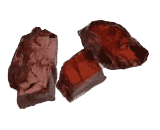 Natural Malaia Garnet Natural Malaia Garnet
Malaia garnet is a mixture of almandine, pyrope, and spessartine. It has remained the preserve of collectors for the 2 decades since it was discovered, mainly due to its extreme rarity.Tanzania is the known source for this lovely gemstone.
Color: orangey pink, champagne, orange brown, copper-pink.
Categories: semi-precious stone
Chemical Composition: [Mg3 + Mn3]AL2(SIO4)
Crystal Group: Cubic
Refractive Index: 1.73 - 1.81
Hardness: 7 - 7.5
Density: 3.65 - 4.20
Occurrence: Kenya, Tanzania, Madagascar
|  Natural Morganite Natural Morganite
Morganite is a rare, pink semi-precious gemstone of the beryl family of minerals. With pink a fashion favorite, morganite is a gem that is much in demand. It has a dazzling brilliance and soft color that ranges from clear pink to a lovely peach.
Color: Pink - Champagne
Categories: semi-precious stone
Chemical Composition: Be3Al2(SiO3)6
Crystal Group: Hexagonal
Refractive Index: 1.577(+-.016), 1.583 (+-.017)
Hardness: 7.5-8
Density: 2.72 (-.05, +.12)
Occurrence: Brazil, Madagascar
| 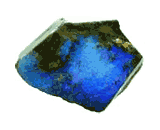 Natural Opal Natural Opal
Opal is the most colorful of all gems. It is a form of silica chemically similar to quartz, but more like glass and containing a variable amount of water within the mineral structure. Its splendid play of color is unsurpassed, and fine examples can be more valuable than diamond. Precious opals (black and white) are cut and polished into cabochons and used in all forms of jewelry.
Color: White, green, blue, black, red, orange, violet, pink, grey, yellow.
Categories: precious stone
Chemical Composition: SIO2nH2O
Crystal Group: Amorphous
Refractive Index: 1.44-1.46
Hardness: 5.5 - 6.0
Density: 2.65 - 3.00
Occurrence: Czechoslovakia, Mexico, Honduras, Australia, Brazil, Tanzania.
|  Natural Pezzottaite Natural Pezzottaite
Pezzottaite is a raspberry-red to pink member of the Beryl Group named after Dr. Federico Pezzotta. Discovered in Madagascar and IMA approved in 2003. It is one of the great new gem discoveries of the last 20 years.
Categories: semi-precious stone
Crystal Group: Trigonal
Refractive Index: 1.604 - 1.615
Density: 3.1
Occurrence: Madagascar, Afghanistan
| 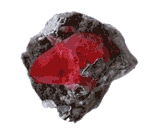 Natural Rhodochrosite Natural Rhodochrosite
Rhodochrosite is a manganese carbonate mineral with chemical composition MnCO3. The pink color of rhodochrosite is caused by the element manganese and it is formed when manganese is dissolved by ground water and combines with a carbonate material and then drips off the ceiling of caves and crevices deep underground.Rhodochrosite often forms pink and white bands. It is often carved into figurines or boxes while the tubular stalactite formations are often sliced for use in jewelry. Fine gem quality crystals are sometimes cut into gemstones for use in high end jewelry, but the more common grade is used extensively in silver and gold jewelry.
Color: Rose red, raspberry red, pink, grey, fawn, brown
Categories: semi-precious stone
Chemical Composition: MnCO3
Crystal Group: Trigonal
Refractive Index: 1.600 ĘC 1.820
Hardness: 4
Density: 3.45 ĘC 3.70
Occurrence: Argentina; Colorado, U.S.A.; Romania; Hungary; India; South Africa; Saxony, Chile; Peru; Mexico.
|  Natural Rhodolite Natural Rhodolite
Rhodolite is a beautiful pink to violetish red garnet which was named after the rhododendron flower. Commercially rhodolite is one of the most important garnets. Rhodolite is quite available in small sizes which are relatively low in price. Very fine large rhodolite garnets are rare and are moderate in price.
Color: red, purple-red
Categories: semi-precious stone
Chemical Composition: Al2(SiO4)3
Crystal Group: Cubic
Refractive Index: 1.75 - 1.77
Hardness: 7.25
Density: 3.74 - 3.94
Occurrence: Brazil, East Africa, Ceylon, India, Madagascar, Zimbabwe
|
|
